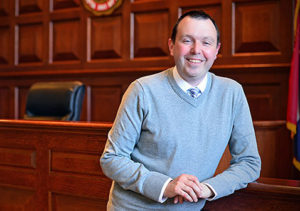Washington University in St. Louis’ newly launched Cordell Institute for Policy in Medicine & Law has signed on as one of the early signatories of French President Emmanuel Macron’s “Paris Call for Trust and Security in Cyberspace,” announced Nov. 12 as part of the peace forum commemorating 100 years since the ending of World War I.
In the document, the signatories, which include many European countries, global corporations and non-governmental organizations (NGOs), urge governments to promote cybersecurity and trust in the internet, increase protections against cyberattacks on elections and prevent theft of trade secrets.

“The institute was approached early on in this process to see if we’d like to sign on,” said Neil Richards, the Thomas and Karole Green Professor of Law in the School of Law and noted expert in privacy law. Richards is co-director of the institute along with Jon Heusel, MD, PhD, professor of pathology and of genetics at Washington University School of Medicine.
“Jon and I talked about it, and decided we should participate,” he said.
“Our mission at the Cordell Institute is to pioneer an ethical data-driven future, promote health and protect people,” Richards said. “If we are going to have a successful future in our digital, networked, data-driven world, it is essential that we establish clear rules promoting trust and security in the digital environment.
“The Paris Call is being issued on the centenary of the end of the First World War, an unexpectedly destructive product of our ancestors’ failure to properly manage the disruptions caused by the industrial revolution. That war almost ended our civilization, and killed millions of people, including my own great-grandfather, who served on the Western Front in the British Army. The information revolution we are living through promises much, from precision medicine and search engines to self-driving cars and solutions to many of the most pressing problems facing humanity. But information technologies threaten new dangers.”
Today, we don’t just face the weapons of the industrial age such as machine guns and poison gas, Richards said, we face the weapons of the information age: hacking, identity theft and the specter of cyberwarfare. Cyberattacks already have the potential to target critical infrastructure, such as our electoral, air traffic control, power, financial or health systems.
“We need to learn from the lessons of our past and ensure that the information society we are building is sustainable, trusted and safe,” he said. “The principles of the Paris Call are a sensible framework for building that kind of society, in which we can have our data-driven future, promote health, and protect people. As a result, the Cordell Institute for Policy in Medicine and Law is proud to join the Paris Call for signatories to these important principles.”
Richards has published a number of academic studies on trust and privacy with Cordell Institute collaborator Woodrow Hartzog of Northeastern University, including Privacy’s Trust Gap, published in the Yale Law Journal in 2017; and Taking Trust Seriously in Privacy Law, published in the Stanford Technology Law Review in 2016.
The Pathologies of Consent is forthcoming in the Washington University Law Review, and Trusting Big Data Research was in the DePaul Law Review in 2017.
Richards’ next book, “Why Privacy Matters,” under contract with Oxford University Press for 2020 publication, will explore these issues in greater detail.